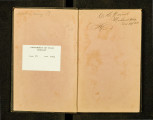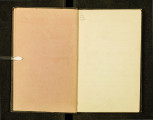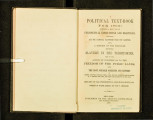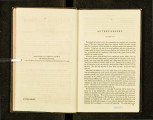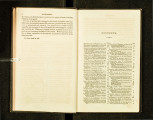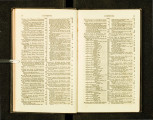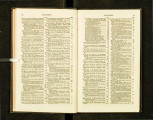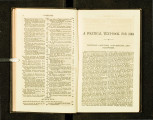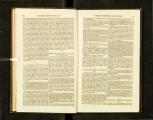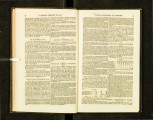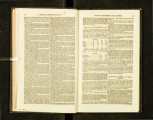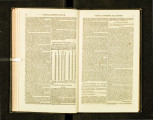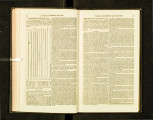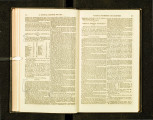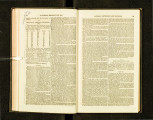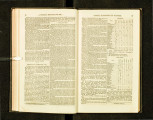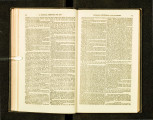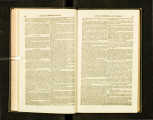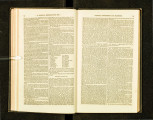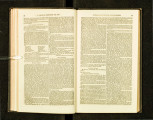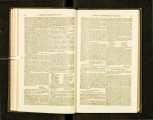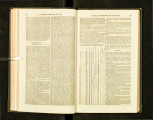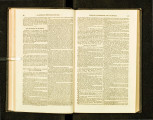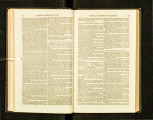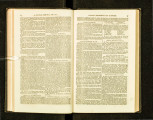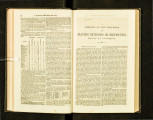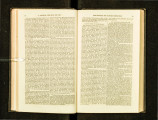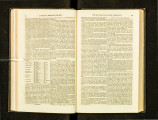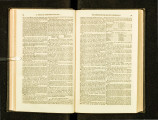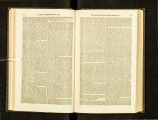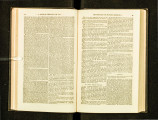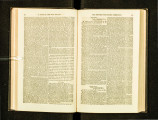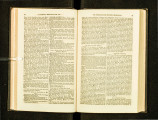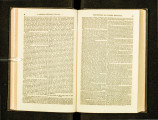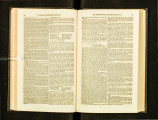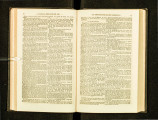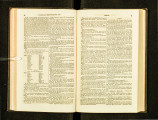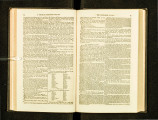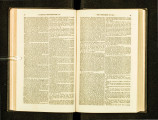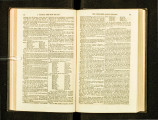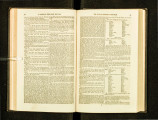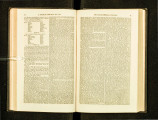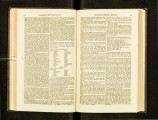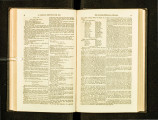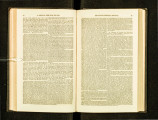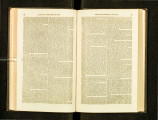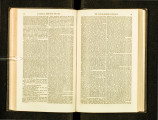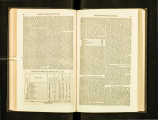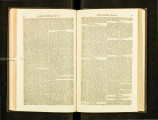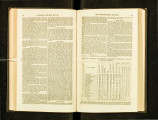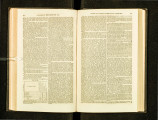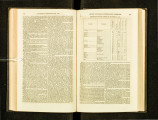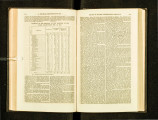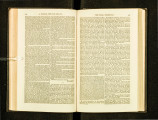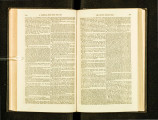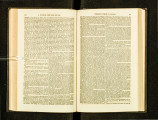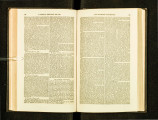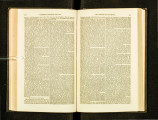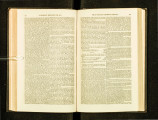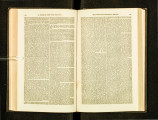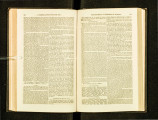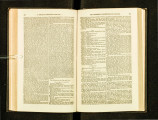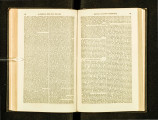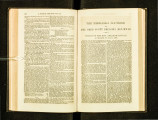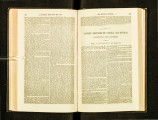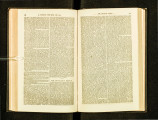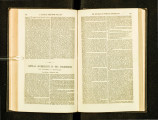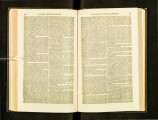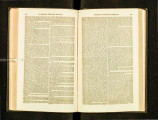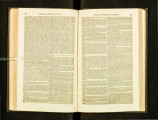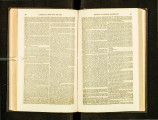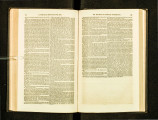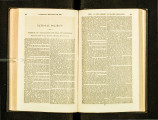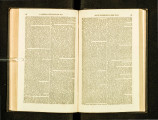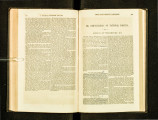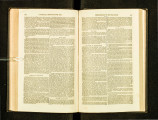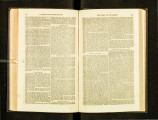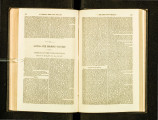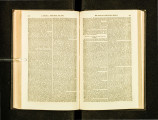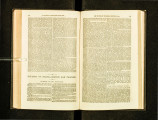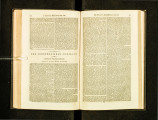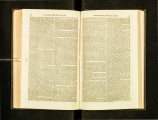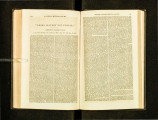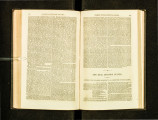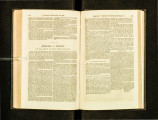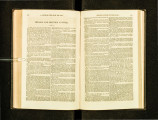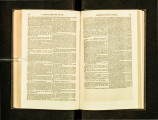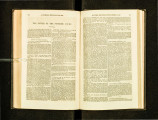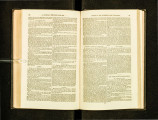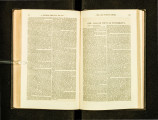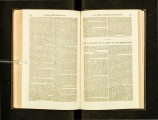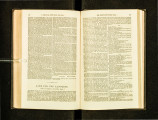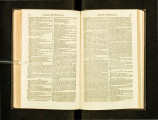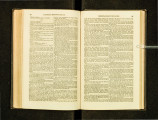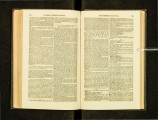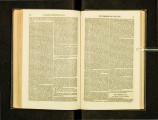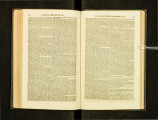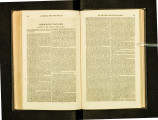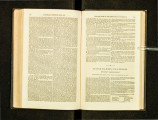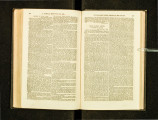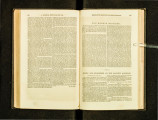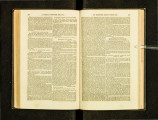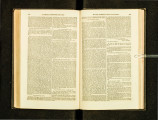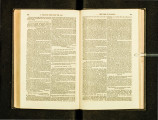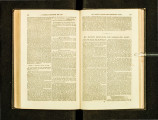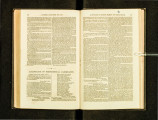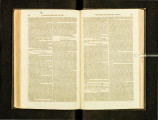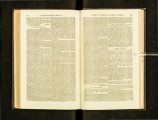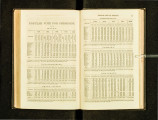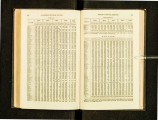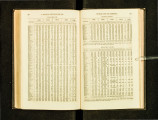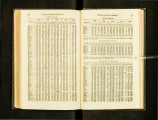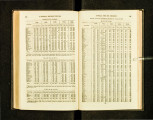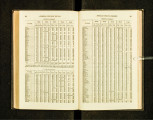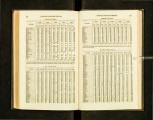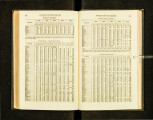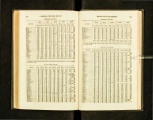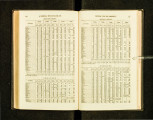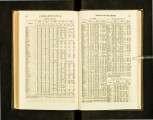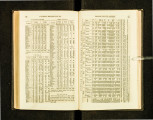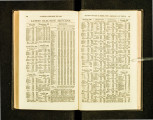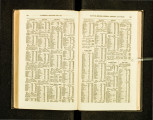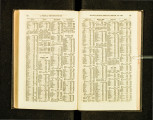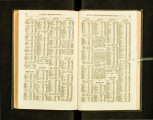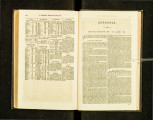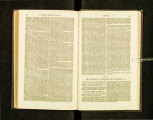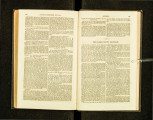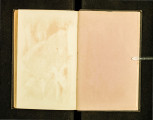| OCR Text |
Show 82 A POLITICAL TEXT-BOOK FOR 18t)0. f t·om Europe, who shall have d c c hH e J t c ntion to b ecome citizens, to vote. Ye .. t , 23; Nays, 21-n.s follows : Ycus-For Clayton's amendme n t : · · I teen at the J1r t it \Yill he fortuna to If, n.mon ~ th l! 111~ 1\ nd the tl: Ill- a ccidents whlcl; s urrou1HI ull, we shull mainta in that numCarncd : I ber to the end. We arc on the eve of the C?n ummatlon of n gn•nt na. Uonal t r ammctlon-:t tmn a.ct ton which will l'lo~ • a cycl~ in tho hl~tory of our cou n try-and It is lmtH)Msiblc not to desire to p:.)lcssrs. Adams, ])b:on, use a moment a ntl survey th • scene arounel Atchison, E vnn:;, Badger, Fitzpatrick, llcll1 Jlou ton, llen.)amln, Hunter, llrodhead, J ohnson, Brown, J ones , o f Tenn., Duller, Mason, Cia y , ]\[ or to11, Clayton, P ratt, Dawson, Se b a~llan, Slldell- 23. Nays-Agains t Clayton' s nmenJme nt: Messrs. Cha se Norrl:;, Do1lgc: of Wise., l'ettit, Dodge, of I owa, Seward, 'Douglas Shl e•lcl , Fessendhn, • mith, J•'i:;h, ~tua.rt, Foot f:u 111 ncr, Gwin, , '1' ouccy, Ha mlin, Warle, J ones, of I own, Wa lker, Wi.llla.ms-21. T!h. Ch ase move d to ame n<l, b y p1·o v iJing fo r t he appointment o f three Co~umi ssion crs .rcsidi no- i n t h e T e rritory to org antzc the T c rn tO I:J• di~iJe it in to e lection Jis tric t s, notify an e lection on t h e fil·s t Mond:ty in c ptcmhe r the n c n s uiug , e t c . nt which e lection tho p o op! ' s h o uld ehoose t hei;. o wn G o vernor, a s well a s a. T e r r i to rial L cgisla. tme-thc Gove rn o r to SCI'\'C fo r t wo y ears, n n d t ho L egish1turc to m eet u oL later than May, 1 55. T h i s e xte n ion of the prineiple of' " 8 qnattcr S o v e r e ig nty" was deft.! ttte<l - Y ca.~. 10 ; .Nays, 3!1. Mr . Douo-Jas's a.mCJHlrncnt was th en a g reeJ to, o.nd tho b iU r e porLcd fro lll the Committee o f t.h e Wll olc to tho S e nate . T he q u estion on the e n gro:-~, nw nt o f tho bill wn.l'J now r e ache d, and it wa.s carri e d: Y e a .._ , ~ 0 ; Nays, 12. J,fat ch 3.- Thc rule as::;ig ning Fritlays f o 1· tho consideratio n of p r ivate bi II :-~ haxing b een s u s p endctl, o n motion of Mr. Badger , tho Senate p 1·oceed ed to put the N cbm ka-Kansn. · bill on its final passa ge, whe n a lo ng and earnc -t d e b a.te e n u e d . At n. late hotu · o f the nig ht llr. Seward, o f N e w York, a ddt·e::;scd t l tc Scn:.~.tc, in oppo ition to tho bill, a fo llo ws : MR. PRESm ENT : I rise with no purpose of further resisting or even del!\ylng- the passa~e of this hill. Let It~ ad \'OcA.tcs ha ve only a little pa tience, an1l t.hey will soon r each the obj ect for which they have Htmgglcrl so carncst.ly and so long. 'l'be sun has set for the la:o~ t t.ime upon t he guara nteed and certain liber t ies of all the Un!lcttled and u n )rg-anlzecl portions of the Amerbm cont in1•nt tha t lie within the jurisdiction of the Unit e•! ' t n.tes. 'l'o-morrow's sun will rise in dim eclipse over t hem. II ow ion ~ tha t obscuration shnlllast, is known only to the Power th:tt dir e.:t'i nnrl controls ILII human evc ntR. For rnyself, l k now only this- tha t now no human power will p revent it:; comIn_~; on, a nd that its p nsging olf will he ha:~tc netl ancl sccurecl by others than those now her e, and perha ps by only thoae belong ing to future ge n eration~:~. • lr, It would be a lmost factious to olfcr furth er r esistance to tills me:.sure her e. Iml~ecl, successful resistance was n ever expecte d to be rn;\de in this Ha ll. 'l'he Senatefloor Is a n old battle-g round, on whic h have been fought ffi'l'1Y contc ·ts, and always, a t lea st since 1 20, lfith fortune adverse to the cause of equal a.nd universal freedom. We were only a few here who enga.gcrl in that cau~ o in the b eginning or this contest. All that we could hope to do -all that we dl1l hope to d o- wall to organize and prep: lre the Issue for the House of Represe ntatives to which the country would look for its decision as authoritative and to awaken the country that it might be r eady for th~ a p-peal which woultl be ma clr whatever tl1e docision of Congress mit"'J be. We nre ~ o stronger n ow. Only four-us al1<1 the prospect before us. However ohscu1·e we may int'llvklua lly be, our connection with th~ll great tntn~actloo will perp utuato our n :tmes for t he pnu e . 01· for the cen· sure of future ngc~ , :wei perhaps m re gton~ far remote. lf the n we hn<l no other motive for our nettons than but tl1 1 at of 'tho honest d e:;ire for a just fame, we could not bb iudiO'I!rent to that scene n.nd that pro~p ect. But indivlrlual interests :tn<l n.mbitlon sink into i n:<ignificanc ln view of Uw !n te rl'~ ts of our cou ntry a nd of mankln rl. 'l'hcRc in terests <Lwaken, at least In me, nn In tense solid! n• le. It wa:'l said by some tn the bcglnnlnl{, a nd It has been snid hy others l1tter iu this d ebat.c, that it was 1ioublful whether it would l>c the cause or la ve ry or the cause or Freedom ~ha t would ga in ad,·:.nt nge:s from th ' passage ot this hill. 1 do not il rl(l It neccss:ny to he c ensorious, nor even u njust to o the rs, in ordl'r that my own cour~e mny be ap} n·ove!l. I nm ~urc that tile honorat,le ,'ena tor from Illi n o i:~ [~l r. D ou gl a~J di•l n ot mean that the 1'1:1\·e, tatt·s shoul1l gain an ;ulvant:u:c O\'Cr the l<'n •c f-ila! t·~ ; for he di:;clalmed It when he In! rod ul·ecl the hill. J , llcl i l'~e In ull candor, that the honornhle ~e nator from (n·or~l a , [)Jr. 'J'oombf! 1 who cmnes out at t ile d nsl' of t he ha t!IP a~ on~ of the ct\1 •feHt le n1ler~ of the victoriou:-; p ·1r ty, i!l ~inenc In <il!clarhw hi~ own opinion that the ~ l:l n- ~t nt!·~ will gaiu no u nju;t advanta;:;-t· over the ~' re e 1'1 :l ll·~, hL••·:~~~~e he •.li~· c laim~:~ it Ml a tl'iumph in thc u· beha lf. Nr1 1l1 1t11~tnnrli ng a ll this IIOWCVl'r what has OI'Cnrre rl 11\•re and in the country', du ri n ~ ti1is contest,, h us compc ll l'd a C'~lllvictlon tha t ' lavery will g ain some!lu ng, and I• l'el·dnm w11l endure n. seve re tiH)IIfili 1 hop \! Utlt an irr c trie i'!LIIle, }()s~. 'l'hc slaveho leilng 8t n!PM arc pa~~~~e, qui •t, <1 1\\l cont~nt, mHI satistlt•d wit lt the prospecttve b ol)n; and the l< rce la tcH aru e xcilcll and a larmed with fea rful fo rehotllni(S an•l a ppr •h e nsin n~. 'J'he imp atienL'e fo ~· the spel!tly pas· s:t"C of the hill 111anife ted hy its fn cnds, betrays a k n~wl •rl ••c that tl1i-; is the con• lit ion of puhlie !:!Piltilll cnt in t llu J.'ru; ~tatt·~. 'J'lwy thought in !.he hel-(inninl{ that It wa~ neCC:!Hiti'Y to ~ uard t he measu re hy insertin!{ the Clayt on IUHL' IHiment which woul•l exclnelc lllliJatUI'u llzcd foreign iuhahi!ant~ 1 of the 'J'c rr!tt~l'i 'S f.rom the rij;ht of s ull'ml-(e. Antl now t hey seem wt lll n ~, wtt.h almost perfect un:w in1ily, to r eli nquish that safegua.rcl, mthcr t han to delay the adopt i•m or the pri ncipa l measure fo1· :Ll most a year, perhaps for only IL week or a day. Su ppoHe that the ~e nat l! should tulll cre to that condition, which so lately was t.houl{ht so 11'1-;c antl so importa nt-what then 'I ,'l'he bill could only ~o hal'k to the Jlo u~ e of l tt• p n•scu tatl v~s, which mu11l, citlw r yie l1l or i111:1ist ! 1 n the one ca~c or In the other, a cil'cbic>ll in favor of the hill would he secured ; for even if the llousl! shoul•l di · a~rec, thl! :-lcnate would ha ve tlnll! to r eec• lc. But the majority will har.u rtl n?· thing, cvt•n on a prusp ·ct so ce rtain :u1 this. 'J'hey w1ll recede at OllCl' without u. moment's further l:ltrugg-le, f1·om the c eHHiilion, :~ nd thus secu re the pa~sage of this bill now, to-night. \\' hy such haste ? Even if the <111e:>tion were to go to the cou ntry hcf•>re a final decision here, what would there be wrong in that'? 'l'h •rc is uo man li ving who will say that tho country nutic ipated, or that liH nutic~putcd, thu agita tion of th is mea sure in Congress, whcu tlu~ Con· g r ci'ls wai:l elccte1l, or even wh en it asscmhlc ti in Decem· ber last. Under such ci rcu m~ta n ceR, a n1l in the ml1l:>t or agita· tion, :U11! cxcikmen l, 1Lil •l rlcbaks, it i:; only fair to ~uy, t hat ce rta inly the country h:ts not d e cide!! in favor of tho hill. 'l'he re fu ~a l , then, to let th !J quc•stion go to the coun· try, is a conc lusive p roof that the Slave ~t.ateM, as rcpre· s •ntcd he re, exper t fro1n t he p:u;snge of t hi:; hill what the ~· rc c tates Insist th at thcv will lose hy it-nn a1 lvantnge, a ma te ria l a dvantage, a nci not a mere }~b:~tmc ti on . 'J'll ~re <LrC men in t.hc ~lave :tate::~ , ns in the Free States, who tn· s ist u.lw:.tys too pt•rtlnaclous ly u pon more abst raction~. llul that il:l not the policy of the, ' lave , tates to-day. 1'hcy nrc In earnest In see king for, a ncl s ccu ri n ~t, an oh. ect! and nn Importa nt one. I bd ievc they arc going to have lt. I do n ot know how long the advantage gai.necl will last, nor how g reat or cornprehensl ve It will be. E ver·y Senator who ar:rees with me in opinion must feel as I do-that un· dcr such circumsta nces he c an forego nothing that can be done decently , with duo r espect to differ ence of opinion, and consistently with the constitutional and scttle11 rules of legislation, to place the true merits or the question be· fore the country. Ques tions somet imes occur which eeetn to have two :d l(ht sides. Such we re the ques tions that dl· vldcd the l<~ngl lsh nation between Pitt and lfox-such the crmtest between the assailant nnd the d efender of Queboc. 1'hc judgment of the world was suspcnued by Its sympa- TilE KAN AS-NEBRA. 'KA 1'11UGGLE. 83 thlc• and seemed r en1ly to llC'scen cl In favor of him who should be mo8t littllaut i 11 conduct. An1l so, when both fell with equal chi vnlry on the 8amc fl e ld, the survivors united In mlsing a eommon monument to the Rlol'ious but rival rncrnorics of Wolfe and 1\l on tcalm. J~ut this contt·~ t. invol ve~ 1t mora l que!'tlon. The "lave Sta t es RO present it. They maintain tha t Afdcan Slavery i~; not ·n vneous, not unjust not iuconsistl'nt with the advancing cause of I Illman n'aturc. Since they so regard it., I do not ' XJl(• c·t to see stntesmcn r epresenting those Rt a t cs lnditrc n 'llt a lwut a vindica tion of tl li~:~ system by the Conl{ r e:-s of till' t ni ted States. On the other ha nd, we of the l<' ree Sta t e~ regard davcry ns erroneous, u nj us t., opprL'SJSivc, a nd til er ·fore absolutely inconsistent with the p r lnclplt•s oft he Ame rican Conslitut.ion an(\ Uovernment. Who " ill ex pect UH to he lndiO'crcnt to tho deci ions of the Amc rlcau p erJJdc and of mankind on :;uch an ! ~s u e ? . . • • Sir 1 mn sur prised llt the p ert inacity wit.h wl1 kl1 the bono; able Senator from Del11warc, rniuc andent unci ho norahlc friend, [Mr. Clay ton,] pe rsever es in o ppo~i n g the grnotlng of the right of su lrra ~e to the lllll1ftlu r alizl·d for·· eigncr in the Territories. Co11 gre~s can11ot deny hi111 tl •a t right. Here is the tlll n l art ic le of th:tt con vc ntlou t..v which Louisiana, inchHling Kansas nud Nc brabka , was ceded to the United ~tale s: " The Inhabitants of the cc1le rl territory shall he !neorporatc< l in the uion of the Unit ed ~ta tl·~. :ulll lld rnlt.!t: rl as oon as possible, acconling to the principles of t.he l<'ed cral Constitution, to th o ('njoymen t of t he ri l(h ts, privilt•gt·~ , and Immunities of the citizens of the United 1-'tat. 'H; nud In the meant.! me they shall be ma lnt:lirH!Il :wd protect t•d in the free enjoy n1ent of their liberty, prop erty, ll.llll the religion they p rofcsR." cln.rk side h n.s IJilS8Cll. I reel quit.c Slii'C that 'l:tvery •t most can get. nothing more tha 11 K<L nsa~ ; while i\ \:U.ra-;k. a-the wider north em r cgion- w ill, u nd Pt' ex,,, ing CII'Ctu ns tn n ccs, escap e, for the l'(•ason t ha t its RtJil aud cl imate are uncongenial with t he l'lt ll)lll's of s!a, c cul•ure - rire, s ugar, cottou, null to ba cco. ,\l o rcoVI! I', int't: the )'UIJI e a tt •n tivn has hecn .so well nnd oo efrtctu .• ll\· clirectc!l to\\'ard the suhj ·<·t , J chcriHh a hope llo,;L ~I a very may he p re ,•ent('d even fro rn gaining a foo' IH)lrl In Kun~n~. ~'ongress only ~i vcs consent, h 11t it dot' r.ot nnd cannot 111troduce l"lavt•ry tl:crc. ~ laYcry will be• crniHt l' ra l!sed b.Y its own OI'CrgT:tsp ing spir .t. No Olll', 1 !lin !Hire, aut lcip a tcs t he pMsihle n ·(·stal1lbhment. c.r· !I.e Afl'ican :-:lave l r arle. 'f'he ride of cmigrnlion to h a1 ,a~ is Lllen:fore to he Sli(Jp lil'd tlll'l e solely by I hi! dull lt''-l.l' fo untain o f MI ILve p rnd uc·t ion. U11t SltLVCI'Y has tth .. o other regio us he idl·s l\ansas to be llllcd f1om tl iiLL founlaiu. 'l'hore nrc a ll of Nt·w l\[ex i('o n ne! all IJf l.'tah nlrendy wit hin the Cnitetl ~tales; a n 1l then th ·re is 'uha, 1l1,;L cow.;umc · s la ve labor a ncl lifc llH fa~t. n:.. 1tny nne <•f the slavcho lding .States can supply it. ; Hn•l hc::.ides thl''l' I'C!{ions, there r<•mains a ll of ~l exico down to th<.: ls1 l11n us. 'l'l1e s t rt·am o f bla.ve lahor flowing f, "· ll :-o :-. lllllll a fou uta ln, nud lJrol.en into sevcml di1 u·~, ut cha nn el:; will not cover so great a fle lrl; ll rHl it b rl:' 1- Hnnn hly to be hoped that the p nrt of it nearest tn Jl. ·· l\'o rt li J'ole 11 ill be l l1C last to h • inundated. Jh tt Afli,· .lll 8laye emigration is to eompete wit h free emigraric.u or I\ l11te 111 ·n, a nd the ~ou rcc of th is latter lid· i~ a~ a tuple as the civ i liz:Liion of the two en ti r e contint'lll:-. 'li:P ho nor a ble :-:enator from De lllll' lll'e lllelltioned, u:-; if it were <t s tartling fae t , th a t twen ty tho usand E uro1 tfill innnig r a n 1s arri ved in New-York iu on1• month. l:'ir·, llt' ha ~ slated the fact wit h too much n1odt•mt ion. On rny r <:t urn to the ca pital a day or two ngo, l llld lwtlvc tho u ·and of tlieHe c r nl~ra n rs will) I11Hl aniv c•l in • l' - \' ork on one 1noruiug, a nd who had thronged lhf' churches on the follo wi11g ::;abiHLLh, to r eturn thanJ.. · fn1 de li ver a nce from the peri ls ofl l1esea, and for their arriva! iu the lrLild, not of 'lave ry uut of U hcrty. I a l:;o tl.auk (l o ci for their Cl<c:tp e, aud for their Colllill!'. They arl now on thd r wa.y W!Jstwar<l, and tile ne111:1 of th ~ pa~:. iHl' of th is hil l, preceding them, will S( •t'Cil u1a ny of tl!lnl t oward Kan ns a nd ~ cbr n~k:t. l::iuch n r ri,•als are nuL ex t raordin ary-they occu r u.lr no!'t every week; a11d tlH: lmmigr:ttion from Germa ny , from (Jr l~a t l1ritain, :end 'l'he inhnh!ta nts of KRnAnf! 1tnd N ehraska a r c cit ir.c nH nlreacly, and lJy force of t his t r eat.y mu~t continue to lH•, and as such t o enj oy the rig ht of suUh 1ge, wh:tt ever l :LW~ you rn11.kc to the con!r:try . M.v op inlom1 arc we ll known, to wit: That !:'la ve ry Is not only an e vil, but a lot' a I \lll<', injurious a n<lultilnute l.v pC'miciou, to :;ndety, whe r eve r· it exists, and in t'Oufli ct with the constit u tioual prind ples of society In thiR count ry . 1 run not willi n~ to ex tend n•>r to permit the e:-. tension of t hat local C\' il into n •gion!! now free within our empire. I know that th ' I' • arc Rome wl10 dill'er from rnc, rwrl who r egard the Cou~litull u n of t.l1 United 'tales 11::1 an instrument which s anctions I-\I :Lve1·y It~ well ns l<'reeclom. But if l could ;ull nit. a propm;l~io n HO Incongruous with the lette r and s pirit of t.h • l<'crl(•ral Constitution, nntl the known RCn t imcuts of its illustl'iouR founl1- e1·s, and so should conc lude UHtt Shtvc1·y was national , I must still cherish th e opinion t ha t i t is an evi l · and bccnuse lt itj a nationa l one, I nm I he more fi rmly h r l;l ll.llll bou 1~rl to prevent an in c r ease o f it, t ending, as I think it mnn1fes1 1y docs, to the weakening and ultilu ate ove rthrow of the Constit uti on itself and th e r e fore to t he injury of tLll mankind. I know 'th e re hnvc been ta t es which hnvc cndur etl lo ng, nnd a c hi ever! much, wllich t.olcrate~l Slavery; b ut th 11.t was not th 11lavery o f eas te, l1kc Afncnn , lavery. 'uch Slavery t ends to d cmom li:r.c cqu!tii.Y the subject ed race and t he superior on e. It l1as u.een the nhscnce of SUCh 81avery from l~tii'O (IC th a t h a.s ~tven her nations t lt ei1· supe l'i ori ty over other countries Ill that henlis pl1erc . f; I:tvery, wher e ver it ex ists, begets fear, and fear is the paren t of weakuess. What, Is the secret or that cternnl, Hleep less anxiety in t he l egi~ l ati ve halls, !tnd even :tt t he fi re itl cs of the ' la ve ~:il.:ttes, alwnys a~king new stipul ~tti ons, n ew co n1 p romise~:~ a nti aurogat1on of compro mi ~c1:1, n e1v a~ urnpt ions of p ower u.nd ahncgn.ti onH of powe r, but fen. r ? lL is t he apprehenSion, ,that, even if Hafe n ow, th ey wi ll not n hvtL.rs or lo ng be secure agaiust some in vasion or some nggrc::;~ion from the Fre~ St!ttes . Wha t is t he s ecr et or the lnuniliat.ing Jl~rt wh1 ch p1·oud old l::ipain is a ct ing a t this d ay, t relll· blmg between a larms of Amer ican in t rusion inti) Cuba on one side, ltnd lJrit ish di ctat ion on the other, but ll1e fact . thrtt ,bile h a~ che r ished Shwery so long ancl s1 ill c.herlshes 1t, in tl1e last o f h er Ame rican co louia l posses SIOns ? 'l'hus fa r KILII:!HS 1tnd Ne b raskrl are s a fe, under the I:L~s of 1820, agai nst th!J in troduc ti on of this element of nattonal debility and d ed ine. 'r he bill be fore ul!, as w~ arc n"sure1l, rontains n. !!!'Cat. p ri n t'ipl e, a glorious pnnclple; nnd yet that p r inci t•le, w h ~Jn ful ly ~~~ccrt.ai n cd, ~ro ves to he nothing less thun the !lub ver:-;ion of th at. •?curll,v not ordy within t l1e Te rrito r! •s o f K ama~ und .~~~.ras~a, hut Within all the o th er prest:nt aut! fu t.urc lt~llil o~·u.-s of the United, tal es . 'l'l llls it is q uite c leur ~hat It 1s not n Jot'inciple al o ne that. is invol ved, hut th a t .ho ·e who crowd tl cll! rn ej\surc with ~<O 111 11 c l1 zea l anrl ca r· ue~t IICH:; 1u u~t expect that c it her 1-'t·cedom o r· SI;L\'ery shall gain so u1ething h.l' it in th o, c re~io n~ . 'l'he case, then, stant!H th uH in Knn!!'as and ~ •hr a.st.. rt : P1·e-ed o rn :n~.v ~.~~e, hut cert a inly c an g ain n oth:ng-; 1vhile ::;la ,·ery oa.y !:•un, lm t a~ certa inly can loRe not bing-. from Norway , a111l from Sweden, du rin~ the Eu nl J•c•lttl wa. r, will rise to six or seven llll ud retl thous:uHI ~:- uul~ iu a y ea!'. And wll h this ti de is to I.Je 111 inglcd one rapidly s we lling from Asia and from the is land:! of the ~ < u1l1 Sea H. All the immigr a nts u n d er this uill, a:; the Jlrn M' of lt eprescn tat ivcs OI'Crrul ing yon lla r eordered, 11 .!1 be good, loyal, L ibc:·ty -loviug, Hl a very -fca1 ing citiz, ... s Come on, then, g c ntlcmeu of the 'ln ve ·r a tes. :::-ince t here is no c:;caping y our chall enge•, I llcccpt it in hthalf o f the c a u. e of Freeclom. We will cnl{age iu competition for the virgin soil of Kansa ·, nnd Ootl give the l'ietory to the side which is stronger in n u m be r·~ as it is in rij!lll. 'l'hcre a rc, howe ver, ear nest a d vocates of th:s hill, 11 hu clo not l'XI H·rt, an!! II 110, l HliJl JIOse, do nut dc,;ire, thai 1'lavery s hull gaiu possc:-:~ ion of 1'\ el>mska. \\'ha d,l t hey expect to gaiu ? '!'he hono r a hle :-:ena[,J :· f ' 1111 fndiana ( 1\l r. Pe t t1t) says th a t hy thu!l ohlitc. a tin~ :h,· Mi!;souri Comproudse rc!l!rictio n , they " :11 !-(:tin a t.d;lllll 7'(t8(( 1 on whi ch the in habilH n ts of Ji: an~ as and i\ chra~t..a m:ty write whatever they will. This is L11c grea t p d udple of the !J ill, as he Ull(h•J·stn nll:; it.. " 'ell, wha t g:liu rs there in th a t ? You oli lit erato a. Co n.;t: t ul ion of l'r c,•. do n1. If t hey write 11 new co ustil ut !on of freedom, t'.tl! t he n e w he b etter thn.n the old? lf th t·y write a l'tl lh:ituti on of ~la ,·ery , will it n ot he It W OI't~c one? 1 ask :h~ ho nor·a hle ~cnator that. Dut the liOil<Jrable f-:ena ll>r ~"~" t hat the p eople Of ~ e h r niika will lJ;t \·e the pril ilt--)!e vf cs tahlisliing ins t il.lltion!' for t h('lllsl'l ,·es. They lnt ,·c 11011 the pri vi lege of esta h lis h i n~ fl'ec ius t ituUnn~. I; il <1 (111- vilege, then, to eslahlisli !::ila1·c y? lf ,..o, whnt a lllot·l\t·r.r arc all our ons titu t io11 s, " II 1'11 }H'e 1·eu1. the• inhahitantr, from caprici(Hl::ily auhv •rt ir1 g- free insti tutions u nci t·~ l alol ishing in:-;t itu t ions of ::: la very ! ::;ir, it Is a sophi,;n1, a ::.ul• ll ct.r, t o talk of Cllll ft:ITing upon a country, alr~!acl.r sc·.:ure in the lJl e~~i n~s of Freedo rn, rhe (Hlwe r of s t• lf-de:-.lru('l.< 11. !So f<~r a~ l am couee: n ed, the til ne r~·r looking on tile \\'h a t mankind ever.rllllllrc wan tl i:; not the n·mo,·al of the Consti t utions of Fn •t•dom w li ch t ill' .)' h ·t l' t', tl1at they r n : ~y rn n kc at 1 heir plc•a sure C o n~ titu t ions of' In l' l ry or of Jr';·cedo m, but. I Ill' w iv ill'gc of rctain:ng l'on~; ·ilu· lions of l•'rcedon1 wll(•n t hey nlrea11y have them, :tnd !Ill! r c111oval of Consti tutions of 1'1avcry 11 hen lht•.v h·tvl' them rhat they 111 ay c"t:tiJiislr Co natitu!ions o f J.'re.·d·HII in tt:'l!ir p lace. \\' · l10lll on tcn aciou~ly to a ll . , i, tJn,; C o n.:~t i tut w n~ of l<'re edolll. Who cl erHlllll~~es :til)' 1\1.10 r .. diligc ullv adhering to sw·h C o n~ti t u li on:-~ ? Who w 1 ulrl dare to (Jenounec a11y 011e fo r tlisloy:tl t.v to our exbtinf( Con~ti tuti o us, if I hey 1re e Consti.t u t io nw of O e~p otbm uull |



